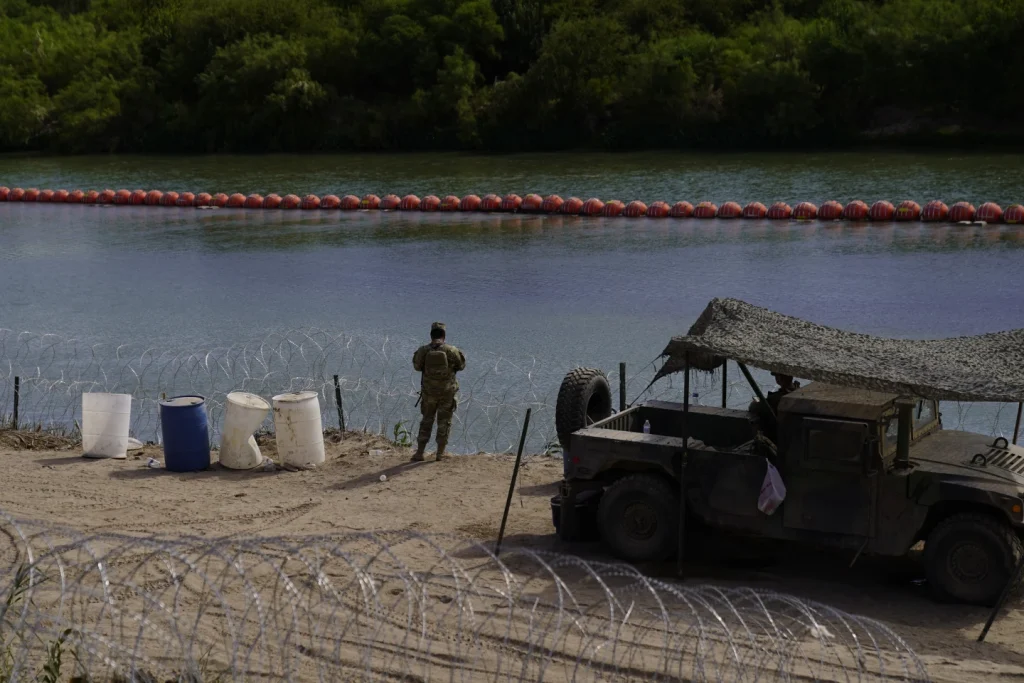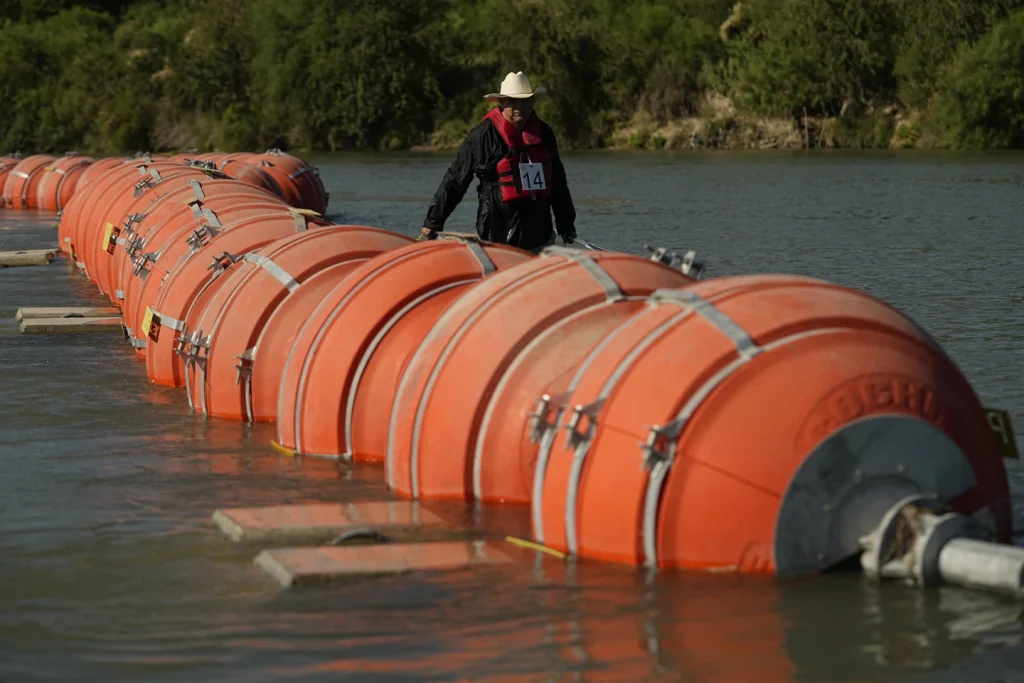In a recent ruling, U.S. District Judge David Ezra has mandated that Texas take immediate action to relocate the expansive floating barrier that Governor Greg Abbott had implemented on the river separating the United States and Mexico earlier this year.
This move comes as part of the Republican’s ongoing efforts to impede the influx of migrants crossing America’s southern border.
While the judge did not explicitly order the dismantling of the colossal buoys situated on the Rio Grande, he expressed concerns regarding their potential to jeopardize safety and strain the relationships between the two neighboring nations.
As a preliminary injunction, Texas has been directed to relocate the barrier from the water to the riverbank by September 15th.
Moreover, Judge Ezra cast doubt on the state’s justification for the barrier, asserting that Texas failed to produce any compelling evidence to demonstrate that the buoy barrier, in its current form, has effectively curtailed illegal immigration.
In an unprecedented move, the Justice Department, under the leadership of President Joe Biden, has taken the extraordinary step of filing a lawsuit to challenge the border policies implemented by the state of Texas.
This legal action marks a significant departure from the usual approach of the Biden administration, which has primarily relied on diplomatic negotiations and executive orders to address contentious issues.
The decision to pursue litigation against Texas underscores the gravity of the situation at the border and the administration’s commitment to upholding federal immigration laws.
By taking this stance, the Biden administration is sending a clear message that it will not tolerate policies that it deems harmful or counterproductive to the nation’s immigration system.
This lawsuit represents a pivotal moment in the ongoing debate over border control and immigration reform, as it sets a precedent for the federal government’s willingness to challenge state-level policies in pursuit of its own agenda.
The outcome of this legal battle will undoubtedly have far-reaching implications for the future of border security and immigration enforcement in the United States.
Texas officials have announced their intention to appeal the recent court decision. Governor Abbott expressed his frustration with President Biden’s refusal to acknowledge Texas’ efforts in addressing the border crisis, stating that the state has taken on a responsibility that should have been fulfilled by the federal government.
Utilizing his authority to combat what he referred to as an “invasion,” Abbott implemented various aggressive tactics, such as the placement of bright orange buoys along a river stretch frequently used by migrants attempting to cross from Mexico.
This initiative, known as Operation Lone Star, forms part of a multibillion-dollar border mission. Additionally, razor-wire fencing has been installed, and state troopers have been authorized to arrest migrants on charges of trespassing, among other measures. However, Judge Ezra, a Reagan appointee, rejected Abbott’s justification for these actions.
In a thought-provoking statement, Ezra criticizes the notion that once Texas determines it has been invaded, it can operate without any external scrutiny regarding its methods of combat.
This claim, according to Ezra, is nothing short of astounding. By granting Texas complete autonomy in deciding how to wage war, this logic effectively eliminates any form of oversight or accountability.
Such a scenario raises concerns about the potential abuse of power and the disregard for international norms and regulations.
The implications of this argument are far-reaching and demand careful consideration. It prompts us to question the boundaries of state sovereignty and the extent to which a nation should be permitted to act without external checks and balances.
The idea put forth by Ezra forces us to reflect on the delicate balance between national security and the preservation of global peace and stability.
The recent controversy surrounding Texas’ use of buoys has drawn the attention of the U.S. Justice Department, which has accused the state of erecting a barrier on the international boundary without proper permission.
This action has raised concerns regarding the legality of such a move and the potential consequences it may have on the international relations of the United States.
Moreover, the Biden administration has also expressed its concerns about the environmental and humanitarian implications of the water barrier.
The use of such buoys may disrupt the natural flow of water and adversely impact the marine ecosystem, while also hindering the movement of migrants and refugees seeking asylum in the United States.
As such, it is imperative that the state of Texas and the federal government work together to address these concerns and ensure that any actions taken do not violate international law or cause harm to the environment and human rights.
In a statement, Associate Attorney General Vanita Gupta expressed satisfaction with the court’s ruling that deemed the barrier to be unlawful and acknowledged its detrimental impact on various aspects.
Gupta highlighted the adverse effects on diplomatic relations, public safety, navigation, and the operations of federal agency officials in and around the Rio Grande.
This ruling signifies an important step towards rectifying the situation, as it recognizes the significant consequences that the barrier has imposed.
By acknowledging the barrier’s unlawfulness and the harm it has caused, the court has taken a stance that prioritizes the preservation of diplomatic relations, public safety, and the smooth functioning of federal agencies.
This decision serves as a reminder of the importance of considering the broader implications of such barriers and the need to find alternative solutions that do not compromise these vital aspects.
It also underscores the role of the court in upholding the principles of justice and ensuring the proper functioning of governmental operations.
The ruling sends a clear message that actions with potential negative consequences will not go unchallenged, and that the court will play a crucial role in safeguarding the interests of the public and the smooth functioning of governmental affairs.
Texas recently implemented a barrier near the border town of Eagle Pass by strategically placing anchors in the riverbed.
This move comes as Eagle Pass, which falls under the jurisdiction of a Border Patrol sector, has witnessed a significant number of migrant crossings this fiscal year, ranking second only to another sector with approximately 270,000 encounters.
However, it is worth noting that this figure is lower compared to the corresponding period last year.
The Biden administration has attributed the decline in illegal border crossings to the implementation of new immigration rules in May, coinciding with the expiration of pandemic-related asylum restrictions.
This water barrier, along with other components of Operation Lone Star, builds upon the efforts initiated during the tenure of former President Donald Trump.
In fact, plans for the same water barrier were already in motion in 2020, as revealed by Mark Morgan, the acting commissioner of U.S. Customs and Border Protection at the time.
After the inauguration of President Biden, Morgan made an announcement stating that the plans for the barrier had been abandoned.
In his statement, he referred to the proposed structure as a “water wall” and explained that its purpose was to serve as a temporary solution in areas of the border where fences had not yet been constructed or were deemed unfeasible.

This decision signifies a significant shift in the approach to border security under the new administration, as it highlights a departure from the previous administration’s emphasis on physical barriers.
By opting to forgo the implementation of this water wall, the Biden administration is signaling a different strategy that prioritizes alternative methods to address border security concerns.
This change in direction reflects the administration’s commitment to a comprehensive and multifaceted approach to immigration and border control, which takes into account not only physical infrastructure but also diplomatic efforts, technology advancements, and humanitarian considerations.
As such, the decision to scrap the plans for the water wall underscores the administration’s commitment to finding more effective and sustainable solutions to the complex challenges posed by border security.
